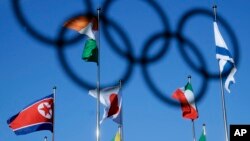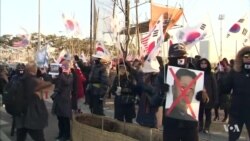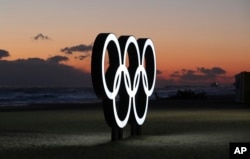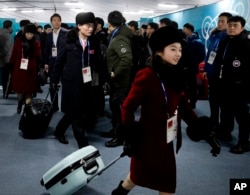The announcement on Monday that one of the highest-ranking officials in North Korea will attend the PyeongChang Olympics in South Korea is raising expectations for a diplomatic breakthrough at the games.
South Korea’s Unification Ministry confirmed Kim Yong Nam, president of the Presidium of the Supreme People's Assembly will lead his government’s official delegation at the opening ceremony of the Olympics on Friday.
“The government hopes that this visit of the North Korean high-level delegation will be an important opportunity for the successful hosting of the PyeongChang Winter Olympic Games as the Peace Olympics, restoring inter-Korean relations and establishing peace on the Korean peninsula,” said Baek Tae-hyun, spokesperson for the Ministry of Unification.
Quiet diplomacy
South Korean President Moon Jae-in, U.S. Vice President Mike Pence, and Japanese Prime Minster Shinzo Abe will also be in attendance, creating an opportunity for quiet diplomacy to proceed on the sidelines of the games.
North Korea’s participation in the PyeongChang Winter Olympics Games has brought about a temporary pause in its nuclear and missile tests. For host country South Korea these peaceful developments validate its support for greater engagement to peacefully resolve the nuclear crisis on the Korean Peninsula.
President Moon Jae-in has been making the case for building upon the Olympics related inter-Korean cooperation to restart international talks to halt North Koreas’ nuclear development program in exchange for economic assistance and security guarantees.
“We have to lead North Korea into a dialogue of denuclearization as well, which will also improve inter-Korean relationships,” said Moon recently.
United Korea
At the PyeongChang Olympics North and South Korea will march together under a special unified flag during the opening ceremonies and will field a unified women’s ice hockey team.
The North Korean Olympic delegation will also include an all female cheering squad known as the nation’s “army of beauties” that will support athletes from both countries. And North Korean Samjiyon Band orchestra and other artists will also perform in both the PyeongChang region and Seoul.
Moon’s Olympic engagement has run up against increasing criticism from South Korean conservatives and even some young progressives who oppose what they see as unilateral concessions to the repressive North.
Pence’s counter message
The U.S. also views the North’s Olympic cooperation as an attempt to improve its threatening image in the world and weaken international support for tough international sanctions.
“I think this is a distraction. I think this is doing what North Korea has always done, which is when things get hot, start talking,” said Nikki Haley, U.S. Ambassador. To The United Nations, in a recent interview with VOA.
Instead of engagement U.S. President Donald Trump has pushed for a “maximum pressure” policy, emphasizing tougher economic sanctions and possible military action, to stop the North from developing long-range nuclear missiles that can target the U.S. mainland.
Recent U.N. sanctions ban the export of North Korean coal, seafood and textiles and cut off one third of oil imports.
Vice President Pence is not expected to engage with the North Korean leadership while in PyeongChang but instead will try to counter the North’s charm offensive. According to a White House official Pence plans to remind the world that the Kim Jong Un led government remains an “oppressive” and murderous state.”
A 2014 U.N. Commission of Inquiry (COI) report documented ongoing atrocities in North Korea comparable to those committed by Nazi Germany. that detailed a network of political prison camps, as well as numerous cases of state sanctioned starvation, forced labor, executions, torture, and rape.
But North Korean leader Kim Jong Un remains unwilling to even talk about halting his country’s nuclear program. To underscore its defiant stance, North Korea is expected to hold a massive military parade on the day before the Olympics opening ceremony, that may show the long-range missiles it has been testing.
President Trump was non-committal when recently asked about the prospects for peace after the Olympics.
“We're going to find out how it goes but we think the Olympics will go very nicely and after that, who knows? We'll find out. We're going to find out pretty soon, I suspect,” said Trump.
The U.S. and South Korea had suspended joint military exercises for the Olympics but indicated they would resume after the games, despite a North Korean demand to further suspend the drills to support improving inter-Korean relations.
And there is increasing talk in Washington about launching a “bloody nose” limited military strike in response to the next North Korean provocation, despite the risk it could spark a deadly conflict in the region, an even escalate into a second Korean War.










